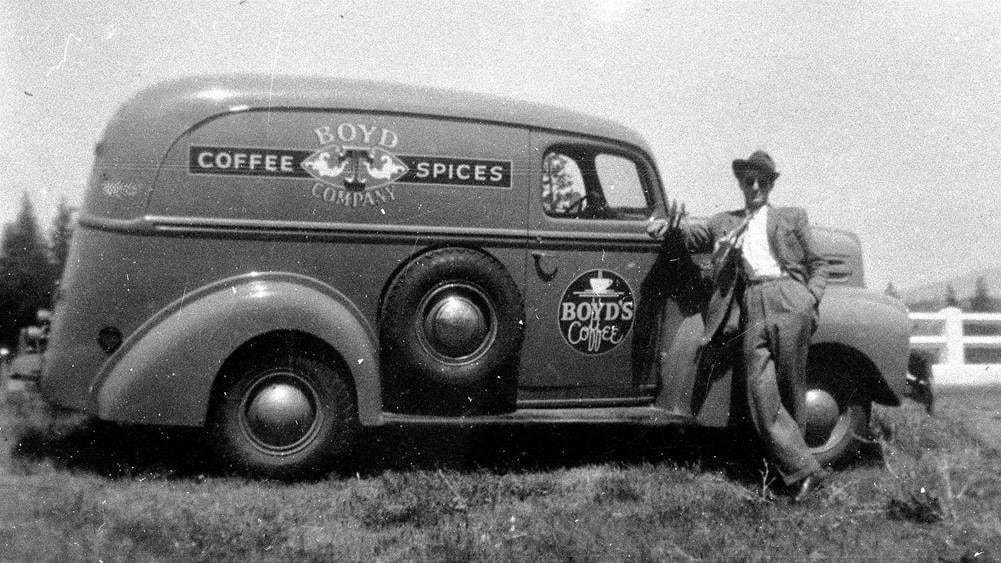In the beginning, there was Boyd's. And for a long time, that's all there was.
Launched in 1900 by P.D. Boyd in 1900 as a coffee- delivery service for Portland-area eateries, Boyd's Coffee survived another 117 years as perhaps the world's oldest family-owned coffee company.
At its height, the firm supplied nearly 6,000 restaurants, hotels, stores and offices, and its innovations—everything from paper filters and instant cider to air pot brewing—would revolutionize the industry.
Lagging market share and a rumored lack of interest among the incoming generation led longtime rival Farmer Brothers to acquire the Boyd's brand in 2017. Then last year, Boyd's announced the closure of its iconic facility on Northeast Sandy Boulevard.
As the hometown remnant of a legendary brand disappears, we asked some of the company's veteran executives and local competitors for the memories of a company that, in many ways, laid the foundation for Portland's coffee culture as it exists today.

Larry Winkler (Boyd's senior vice president of national accounts, 1999-2001): At the turn of the last century, P. D. Boyd was the first roaster to provide loaned brewing equipment to restaurant accounts and thereby secure their business.
Paul Leighton (president of Cape Horn Coffees, former president of the Specialty Coffee Association): They went through the Depression, they went through both wars, and they came out of that cycle of history with a good foundation—a tight family, a small business, and a very small town.
Winkler: Boyd's really defined [Portland's] coffee industry. I mean, they weren't just No. 1. It was really the dominant roaster.
Leighton: Back in the '50s, there were like seven or eight roasters in Portland. By the late '60s, we only had one. That was Boyd's.
Don Dominguez (K&F Coffee Roasters co-founder): For a period, until Coffee Bean International and Kobos came into the picture, Boyd's was the only coffee roaster in Portland. They were big. Huge. I used to tell our customers that Boyd's spilled more coffee than we would roast.
Jim Roberts (Jim & Patty's Coffee co-founder): Their plant was impressive. They had a roasting control room in the middle of a bigger room just like the glass room where Homer Simpson looked after the nuclear reactor—all kinds of dials and buttons and levers and people watching these huge roasters.
Steve O'Brien (Boyd's vice president of sales-distributor accounts, 1992-1997): Our sales force were the New England Patriots of the coffee industry—walking around with our chests out. We didn't apologize for being more expensive. We were the highest quality. If you wanted the best, put out your money.

Rudy Boyd took over for his father after World War II and oversaw the company's steady growth throughout the 1950s and '60s, as successive Boyd innovations revolutionized the industry. In 1975, Rudy's son David assumed control of the family firm until brother Richard took the reins in 1991.
Winkler: Office coffee service didn't really exist before Boyd's.
Leighton: In 1950, coffee in the office was rather rare. By the mid-'70s, office coffee service was expected, and somebody has to deliver that account.
Dominguez: They were the first to make a filter drip system for thermoses. You could only buy it from them, and they manufactured their own coffee filters for that system.
O'Brien: I give David Boyd, president at the time, a lot of credit for developments. He was an innovator—the Steve Jobs of the coffee industry.
Winkler: I ran a route in the San Francisco Bay Area serving Wendy's, which wasn't a great volume account. They served coffee for all three meals, and after a pot sits on a heater for 30 to 40 minutes, it's going to be bad product. [David] Boyd was so particular about our clients serving the best coffee to their customers that we provided air pots so restaurant operators could get four to five hours of life from each pot. I know our competition saw this and laughed: "Who are these people? Where do they come from? What are they doing putting their coffee in air pots? They're going to use less coffee!"
O'Brien: Hot egg nog was another. Our biggest user was Mrs. Fields Cookies. There might have been 20 stores, and they all had automatic machines. You push a button, and hot water whips the mix.
With David and Richard Boyd sharing power as co-CEOs, the brand expanded into dried goods sales and overseas markets. By the turn of the century, plans were underway to double the size of their Portland manufacturing plant.
Dominguez: If they could go into a restaurant and supply coffee service, it was natural to offer all the spices—the thyme, the sage, the rosemary, the peppercorns, the garlic salt.
O'Brien: Then, they started doing other things like soup mixers. The big item was a cream base you'd mix with water for the best New England clam chowder you'd ever want to taste. And, then, barley vegetable, Italian tomato, split-pea…
Dominguez: …freeze-dried potato flake, instant hollandaise sauce, nacho mix, pancake mix…
Winkler: …sauces, gravies, desserts, salad dressings…
Dominguez: All of these instant foods were very lucrative. They did very well. Go look at their building to see how much space they'd dedicated to coffee. As far as I knew, the food services side expanded two or three times, but they left the coffee side alone.

In 2013, The Oregonian wrote that Matt, Michael and Katy Boyd were "resolved not to be the generation that blows it for Boyd's Coffee." But they may never have had much chance. While Boyd's Coffee fought to maintain its presence amid a world colonized by Starbucks, spiraling public demand for beans perceived as gourmet weakened the position of a business that had never relied on marketing to consumers.
Leighton: Boyd's made their money in the diners. They grew up with the community, but not as much the home as the restaurant.
O'Brien: I started selling to restaurants at $2.03 a pound when they announced there was a frost in Brazil. This was 1976. It was all over the news. Over the next six weeks, we took our price up 90 cents. A month later, we were at $3.13 per pound. People were about ready to kill me.
Leighton: I think they lacked modern marketing. If you look at some of their [advertising] over the last 10 years, it was clever, it was cute, but they were behind the times. They were already antiquated and considered old and stodgy.
Dominguez: That company was always afraid to raise prices, and they were having an increase every week because the market kept going up. I think they were so reluctant that they didn't raise prices fast enough.
In 2017, as Boyd's representatives acknowledged falling corporate revenue, longtime rival Farmer Brothers acquired the brand. The following year, all Portland operations were consolidated within Farmer Brothers' Texas facility.
Dominguez: I think their business profile had changed. Or, actually, the industry changed on them, and they didn't.
O'Brien: Starbucks surpassed us as far as the perception of gourmet went. We tried to catch up—"No, no, no, we're the premier guys"—but that was a difficult row to hoe because Starbucks was really good.
Dominguez: Boyd's started opening these Red Wagon stores, but retail wasn't their forte. It was just much easier for them to roast coffee and deliver it to a restaurant or an office coffee service. They did that well, and retail is a different beast—more personnel, a lot more overhead.
Roberts: Their focus hadn't been on retail for a long time. They didn't really want to try and relate to the specialty coffee world. As I understand it, they were more interested in traditional roasters—you know, ordering coffee for restaurants.
Leighton: Red Wagon didn't mean anything. They simply opened a little retail storefront, but the commercial public wasn't there yet. We didn't have coffeehouses in Portland back then. Twenty years from now, you won't know them because they weren't a coffeehouse company. They weren't in that business. In some respects, they were already buying specialty coffee. They just didn't see the railroad train that came out of Starbucks.
Dominguez: They really had the opportunity to be like a Starbucks, but they just plain decided not to. And, later on, that hurt them. They kept doing what they were doing, they stopped competing with little guys like me, and that really stopped the innovations.
Leighton: Even though they tried to do other things, it didn't happen. They bought better quality than anybody else in their industry, and they lived on quality. That's a worthwhile brand. That means something.

Don't Worry, There's Coffee | Our Favorite New Cafes | Remembering Boyd's Coffee | Portland's Best Tea Programs | A Survey of Portland Coffee Cake | Trends Your Barista Wants to Die in 2019 | A Coffee Mug Pictorial

